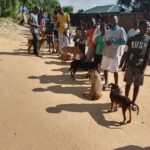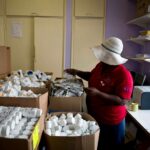New AIDS Vaccine ‘Cures’ Five Patients, Report Claims
Published on February 28, 2017 at 11:39 AM by FACE OF MALAWI
Three weeks after Prof. Maduike Ezeibe of Michael Okpara University of Agriculture, Abia State claimed to have discovered a cure for HIV/AIDS, Spanish scientists over the weekend said five patients living with the disease are virus-free seven months after taking a new vaccine.
According to a study published in New Scientist but first reported by DailyMailUK Online, the treatment, developed by researchers in Spain, allowed the patients to stop taking regular antiretroviral (ARV) drugs – the current method of suppressing HIV.
Scientists are yet to test the results in a large-scale clinical trial, but they say the vaccine may be a “functional cure.”
It is the first step towards success in a field that has failed to find a vaccine in the last 30 years.
Dr. Beatriz Mothe, from the IrsiCaixa AIDS Research Institute in Barcelona, Spain, said: “It’s the proof of concept that through therapeutic vaccination we can really re-educate our T cells to control the virus. This is the first time that we see this is possible in humans.”
Mothe and her colleagues used an HIV vaccine made by Professor Tomáš Hanke from the University of Oxford in the United Kingdom (UK).
The study included 13 participants, who had taken ARVs for a little over three years on average – all within six months of being infected.
After four weeks, eight of the patients saw the virus rebound. But the other five patients have gone six to 28 weeks without having to restart the treatment.
The virus became temporarily undetectable, but it has never gone above 2,000 copies per milliliter, which is the criterion to restart treatment.
Meanwhile, the Chief Executive Officer (CEO) of the Nigeria Centre for Disease Control and Prevention (NCDC), Dr. Chikwe Ihekweazu, told The Guardian yesterday that there is no cure for HIV/AIDS as claimed by Ezeibe. “No, there is no cure for HIV. It is important that we do not deceive our people. There is no cure for HIV. However, treatment is available that allows those infected to live healthy and productive lives. We encourage everyone to get tested, know their HIV status and if positive, get treatment in one of many centres in Nigeria. Treatment is free,” he said.
Ihekweazu said NCDC wants to avoid giving false hope to patients who may now abandon their Anti Retro Viral (ARVs) drugs thus leading to an increase in prevalence and mortality from the disease. He said the agency also does not want a situation where the trust of partners and donors in the Nigeria`s health system is lost.
How about the claim of HIV cure by Prof. Ezeibe?
The NCDC boss said: “Science is universal and there is no place for sentiments when it comes to science. While I would love for this breakthrough to come from Nigeria, there should be no emotional considerations in assessing the validity of scientific evidence.
Source: Guardian
Subscribe to our Youtube Channel:


